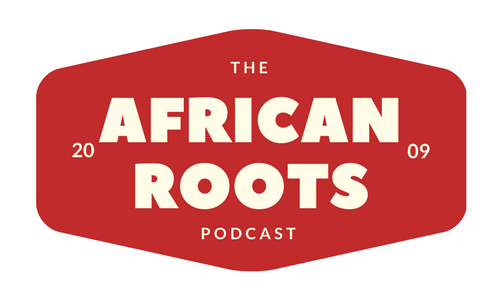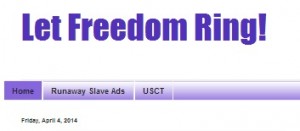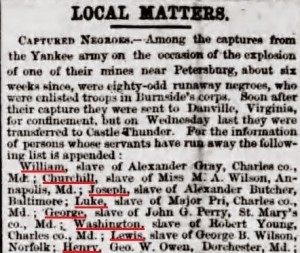Welcome back to the African Roots Podcast!
I can be reached at AfricanRootsPodcast@gmail.com!
***************************************************************************************************
EVENTS
***************************************************************************************************
In Harper’s Ferry a two day event will unfold celebrating the history of the USCT Recruitment station that was there. Many people think only of the John Brown Raid, but the same area was a critical recruitment station for US Colored Troops. Dates are April 26-27 froom 11am 4 each day. Events are free but there will be a charge for parking.
_ _ _ _ _
The Middle Peninsula AAHGS is holding a Show and Tell event at their meeting tomorrow in Tappahanock Virginia. The event is free and open to the public. Documents, old photos, or family artifacts are among the items participants are encouraged to bring with them to share and discuss.
_ _ _ _ _
The Federation of Genealogical Societies has announced that the nomination for awards is now open until June. This is a chance to acknowledge the contributions of a person or a society to the field of genealogy. So consider nominating an organization or a person who has become a leader and made an impact on the community.
***************************************************************************************
CALLS FOR PAPERS
***************************************************************************************
The Ohio Genealogical Society has released a call for papers for the 2015 annual conference to be held in Columbus Ohio. They are welcoming submissions for presentations on a variety of topics from Ohio history to pioneer history, ethnic genealogy topics, African, European, Native American, and so much more. This is one of the major events in the Midwest that takes place every spring, and you are encouraged to take a look at their call for 2015. The deadline is July 1.
_ _ _ _ _
Association for Preservation of Artifacts and Landsapes
The Pioneer America Society: Association for the Preservation of Artifacts & Landscapes (PAS: APAL) will hold its 46th annual conference in Oklahoma City, Oklahoma, from October 9 to 11, 2014. We as genealogists should think of those groups that work on the preservation of the historical landscape where our ancestors lived. I am sharing this as there is a rich history of African American history on the frontier and yes, in Oklahoma. We should look into societies such as this that work to preserve the historical landscape of our ancestral communities. this conference will take place in the fall and will be welcoming submissions to present until early fall.
***************************************************************************************
A Research Study – Full Genome Sequencing Opportunity
***************************************************************************************
Have you ever wished that you could afford to take the top of the line DNA test? I am referring to the Full Genome Sequencing test. Well there is currently a study underway at the National Institutes of Health that will allow participants to have this done and not have to pay the $1000 plus for such testing.
It is called The ClinSeq ® Study and this is a project that seeks to learn about the role that your genes play in your health. We do this by getting a DNA sample from you, sequencing most or all of your genes, and then comparing that to what we know about your personal and family health histories. They will be looking at genes relating to a variety of health conditions. These include things like heart disease, breast cancer, and hearing loss.
Our goal is to enroll 1500 participants in the project. So far, we have over 900 participants, and we still need more volunteers for the study. At present they are hoping to add more African Americans to the study as well. If you are interested see the link above. This might be an interesting opportunity to learn more about one’s health and history.
*****************************************************************
Genealogy Events
*****************************************************************
The African American Genealogy Group in Philadelphia has their spring event coming up in May which is not too far away. They are sponsoring an event on May 3rd, which will be a full day with Tony Burroughs of Chicago. The event will consist of a full day of presentations and the charge is $40 for members and $45 for non-members. For more information see link above.
*****************************************************************
Podcasts and Presentations
*****************************************************************
Last night’s episode of Research at the National Archives and Beyond consisted of a sobering presentation by Judy Russell the Legal Genealogist. Her topic was Slavery in the North. This was an enlightening discussion on the little discussed topic of slavery north of the Mason Dixon line. The prevalence of slavery in New England, the mid-Atlantic and even parts of what we call the mid west were presented.
When we tell the story of our ancestors, we need to know the laws that affected them. This show was outstanding, and enlightening. And it should be pointed out that if you don’t know Judy Russell, you need to know who she is and listen to her present. Also take note that if you are thinking about attending MAAGI, Judy Russell will be on the faculty there as well in July teaching about Slavery and the Law.
Tune in to hear the archived version if you missed last night’s discussion. Ms. Bennett’s show airs every Thursday evening at 9pm on Blog Talk Radio.
*****************************************************************************
Online Digital Collections
*****************************************************************************
Historical Society of Pennsylvania Digital Collection
On one of the images I was delighted to see a collection of pages from the papers of William Still detailing people whom he assisted on the Underground Railroad. This was amazing to see and it must be one of the few notations made from this secret underground movement!
Journal of Willian Still Documenting UGRR in Pennsylvania
* * * * *
Lincoln University Special Collections
A link was share with me earlier this week from Lincoln University Archives. The Langston Hughes Memorial library has some amazing holdings. Alumni magazines, yearbooks and some wonderful directories that you can only find there. I always appreciate seeing early 20th century publications and images and they have a vast array of documents on their own site about early Lincoln university year.
And by the way, are you aware that Lincoln University is the very first HBCU? Lincoln was established in 1854 and is the first historically black institution in the nation. What an amazing legacy! I know many think of Tuskegee or Howard as the oldest, but Lincoln nestled in the farmlands of Pennsylvania is the very first one.
* * * * *
African American Women in Iowa
This is an interesting collection on the library site of the University of Iowa. The collection contains photos, articles and documents that are part of the Esther J. Walls collection. There are some really nice photos—family portraits reflecting black families and numerous articles about social life in Iowa for people of color.
* * * * * *
Duke University Behind the Veil Oral History Project
This is the largest Oral history project focusing on American segregation in the south from 1890s through the 1950s. Over 1200 interviews were taped and over 400 of them are online to hear. You must take a look at this amazing site and listen to some of them! I listened to an amazing one from Arkansas in St. Francis County. If you want to get a good overview of history as it is told by those who lived through it—this oral history of southern segregation is an amazing one.
Interviewees came from Alabama, Arkansas, Florida, Georgia, Kentucky Louisiana, North Carolina, South Carolina, Tennessee, Virginia
* * * * * *
So, the greater lesson is learning one’s local history. Ask yourself, how well versed you are in the history of the region that you research. This is so critical in terms of what we should do as we attempt to tell those stories! So many rich stories, but they cannot be told withouth the backdrop of history upon the land from which the families emerge! We must do this—and even if you feel that you have been derailed from your genealogy, you haven’t been. You have to learn this and incorporate this history in to that family narrative.
* * * * * *
Thanks for listening and in the meantime continue to keep researching, keep documenting and keep sharing what you find!





















